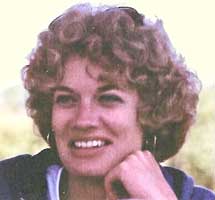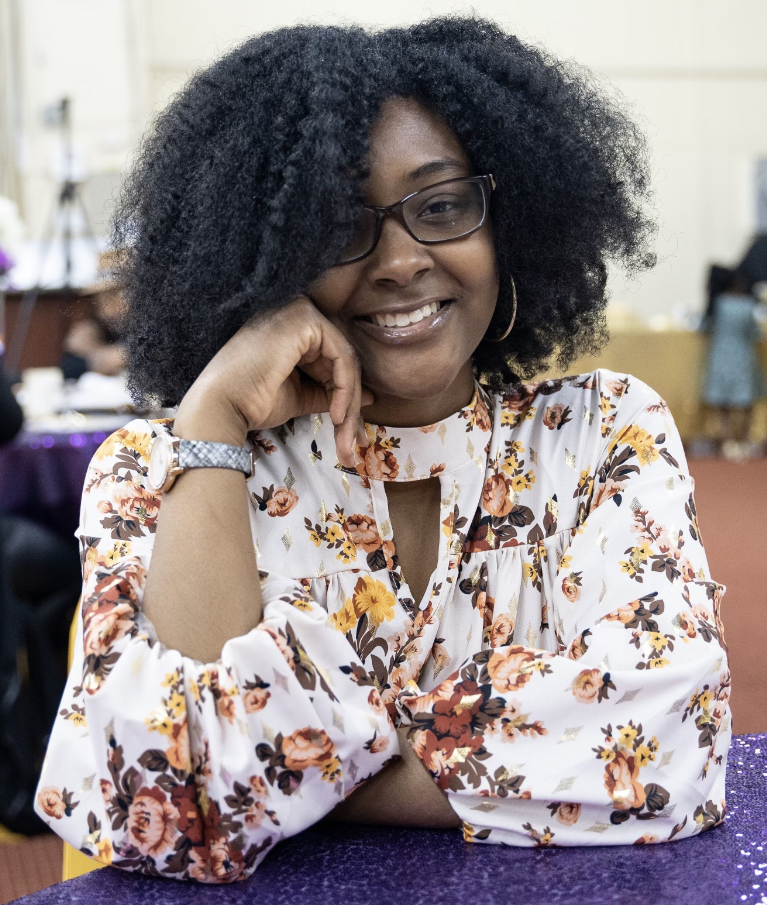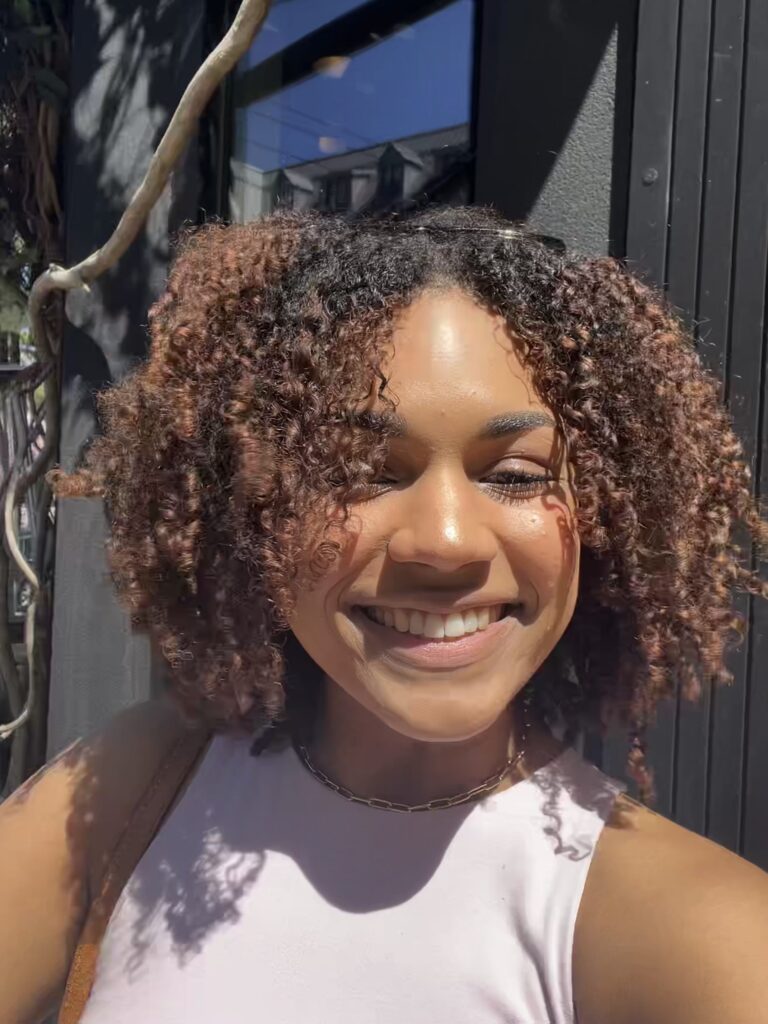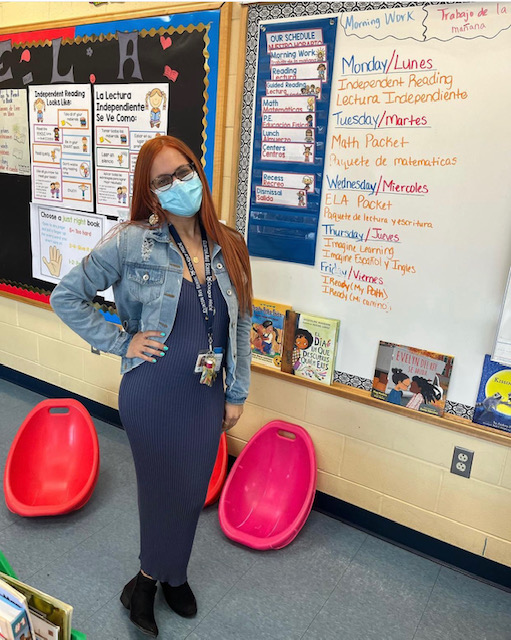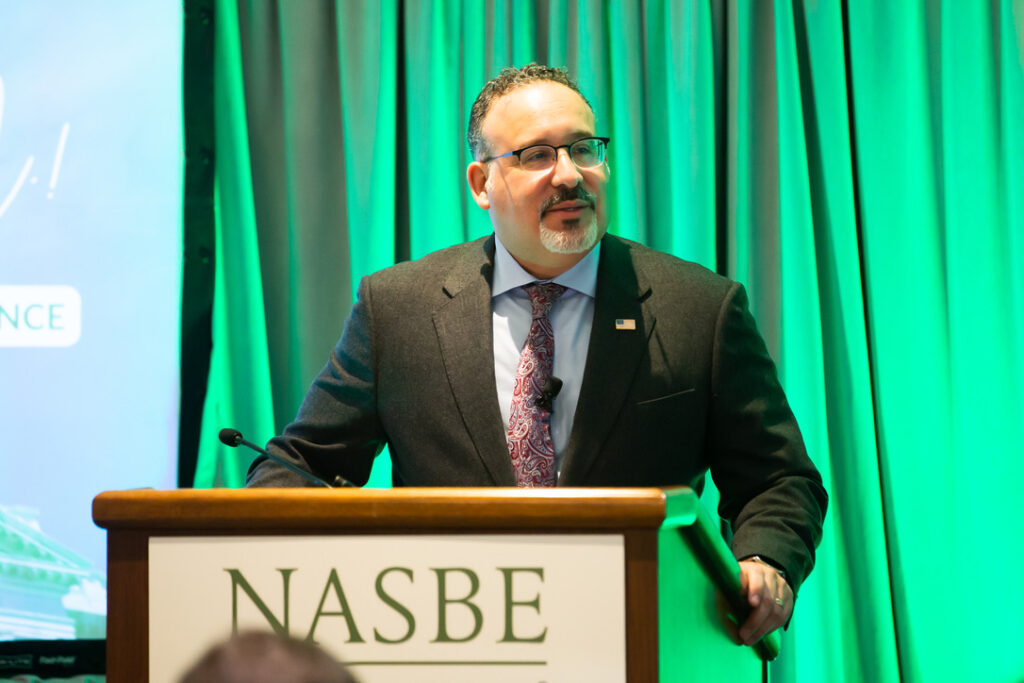
Secretary Cardona addressing NASBE conference
The Alma Exley Scholarship family has followed Miguel Cardona’s career over the years with admiration and a measure of pride.
Since we honored him in 1998 as a student at Central Connecticut State University, he has climbed to the heights of educational leadership as Connecticut Commissioner of Education and U.S. Secretary of Education.
I was delighted to connect with Dr. Cardona recently in the nation’s capital, where he addressed the National Association of State Boards of Education.
He began his remarks by acknowledging the Alma Exley Scholarship Program which, he said, gave him a scholarship at the age of 21 and boosted his confidence as he was about to begin his career. How gracious of him to highlight the impact of our scholarship with yours truly in the audience.
Everyone who supports our scholarship program can feel good about helping to launch the remarkable career of Miguel Cardona–and so many other outstanding educators.
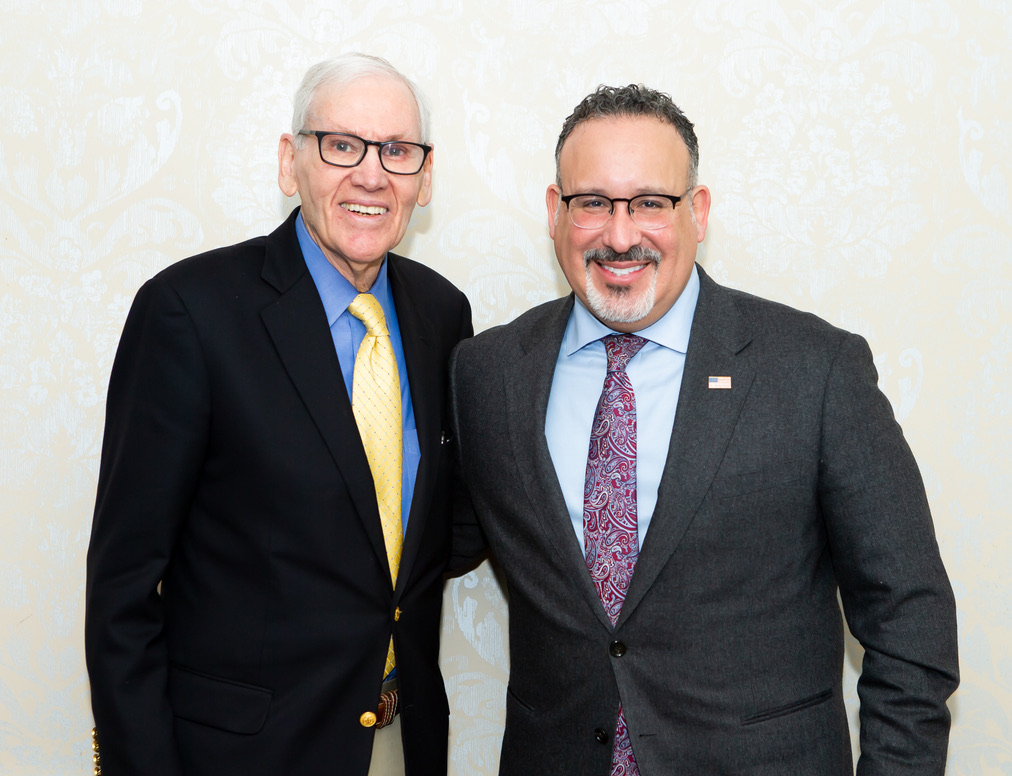
Woody Exley with Secretary Cardona at conference
Surviving COVID Through Collaboration
Speaking to board members from 20 states and territories, Dr. Cardona reflected on how the education community survived the COVID pandemic not just because of funding, but also through collaboration among educators, health professionals, labor, and government.
“In so many ways,” he said, “state boards of education have been the ones driving this collaboration. You’ve been the ones reminding us that we need to come together for our children. You’ve been the ones driving the bold policies that can transform a broken status quo in education.
“We’ve arrived at a crossroads,” he said. “We could be at the dawn of an educational renaissance in America – or in the last year of an educational ‘flash in the pan.’”
Dr. Cardona said the Biden Administration has delivered historic investments, from the $130 billion American Rescue Plan to the $2 billion investment in the Bipartisan Safer Communities Act to build safer, healthier schools.
“And red and blue states alike have seized this funding to raise the bar for students,” he said.
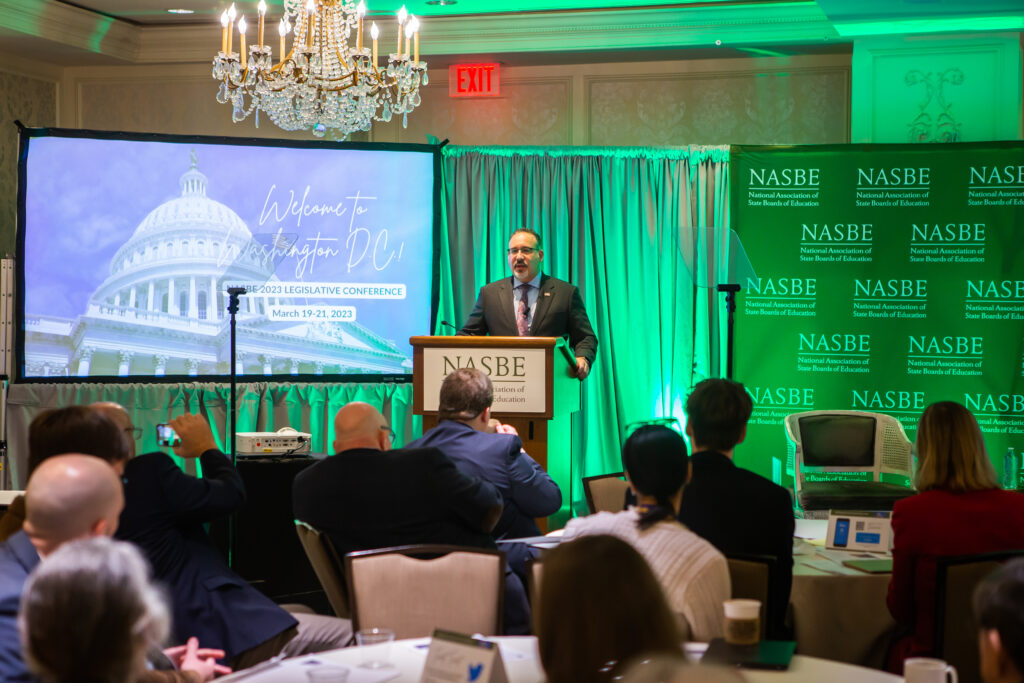
Raising the Bar
“You’re raising the bar for academic excellence . . . Like in Tennessee, which is accelerating recovery with a $170 million investment in high-quality summer learning programs and math and reading tutors, because we know extended learning time works.
“You’re raising the bar for learning conditions. . . Like in Oklahoma, which is using ARP funding to hire more counselors, mental health providers, and recreational therapists across 181 school districts.
“And you’re raising the bar for pathways to global competitiveness. . . like in Washington state, which has doubled the number of districts offering dual-language programs, giving more students the competitive advantage of multilingualism.
“You’ve raised the bar for progress in education. Now, my charge to you is: help us build the system it will take to sustain that progress, to make sure it outlasts all of us.”
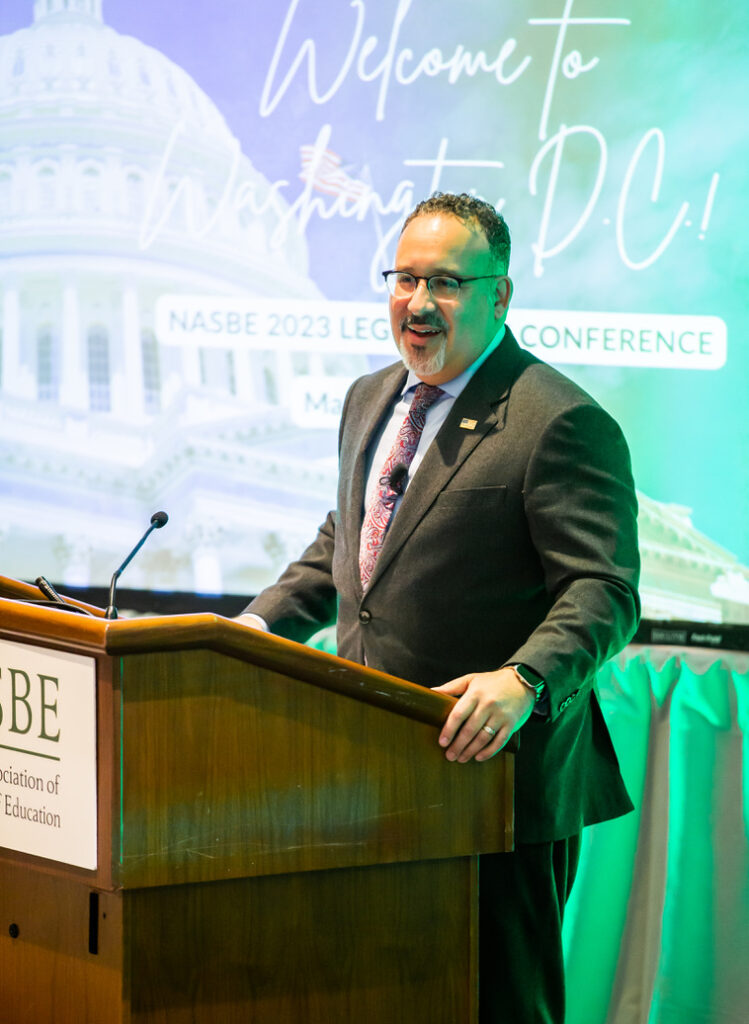
Systems Superior to Superheroes
The Secretary said that, in education, we rely too much on superheroes to drive change, whether it’s a Wonder Woman principal, using a lasso to bring educators and families together, or a Spiderman superintendent untangling a web of bureaucracy to free up dollars for summer programs, or a Hulk on the state board, strong-arming business relationships to ensure students in technical schools learn in-demand skills.
“A superhero can make a big impact, but none of us will be in these jobs forever,” he said. “What happens after we’re gone? That’s why I always say, transformational change will rely on systems, not superheroes.
“We know that ARP (American Rescue Plan) funding won’t be around forever. That’s why President Biden’s new budget is about sustaining your progress for years to come
Proposing Budget Increase
“When I appear before Congress, I will be fighting for you, for a budget increase of 14 percent so that your states have the support you need to keep doing their jobs.
“The budget includes $3 billion to boldly address the educator shortage. It includes $18.2 billion for students with disabilities and another $2.2 billion for Title I schools on top of the nearly $2 billion increase we’ve already secured.
“And it includes major new commitments to finally make universal pre-K and free community college a reality in this country.
“We can’t shrink our aspirations or slow down our recovery efforts. Because how we act now won’t just determine the appetite for education funding for years to come. It’ll determine whether the transformational change you’ve started in your states is sustainable. Whether it’s built on systems that last, instead of superheroes who won’t.
“Today, I ask you to focus on building systems and mechanisms for intentional collaboration that will outlast your time in this role.”
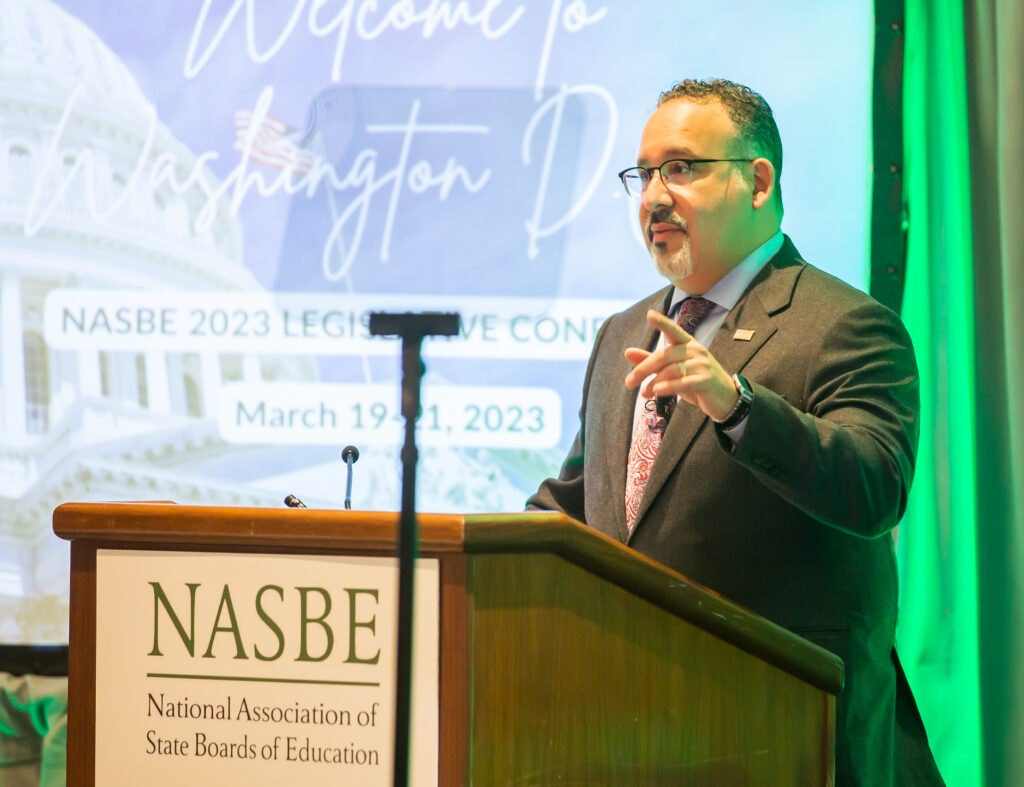
Stronger Together
Dr. Cardona told the story of someone who received a house plant with large leaves growing from three separate stalks. Over time, as the weight of the leaves grew, each of the stalks drooped toward the floor. They could not stand upright without being propped up.
Later, the owner of the house plant saw a plant exactly like it in a waiting room. But this one stood fully upright. No sticks, no wires, no supports.
This plant also had three stalks, but the stalks had been braided together into one stronger stalk. Each stalk alone could not stand tall. It needed to be braided with others.
“That is a metaphor for where we are in education,” he said. “What got us through COVID was not just the funding, but also what we did with it by braiding our strengths together.
“It’s time to ask yourselves: Are the seeds of progress you’ve planted going to grow into stems that bend and break? Will division and partisanship separate our plant stalks?
“Or will those plant stalks flourish because they’re braided together, in partnership with colleges and universities, labor and workforce partners, community organizations, and health care?
Collaboration on Behalf of Students
“Now is the time to braid our efforts with health providers to build Tier 1 mental health supports for students.
“Now is the time to braid our efforts with labor to reimagine professional development and leadership opportunities that retain great educators… And bring pre-service teachers into the classroom with better pay.
“Now is the time to braid our efforts with colleges and workforce partners to create a sense of mutual accountability on dual enrollment and career pathways… Because there’s a tsunami of great, well-paying jobs coming–and we have to be ready.
“Now is the time to braid our efforts with the science on early childhood education and effective bilingual education and push harder than ever to strengthen systems and increase oportunidades.
“Ya es tiempo de aprender otro idioma!
Controlling the Narrative
“And now is the time to braid our voices in support of each other, so we can stand taller, speak louder, and unapologetically control the narrative on public education, and the cost of continued disinvestment.
“We are in this together! Whatever the mechanism, I hope you get creative about setting up something that can outlast you, and benefit students for years to come.
“We’re gathered here at a critical time… What we do together could mean the difference between renaissance and restoration – between transforming our education system for good or going back to a broken status quo that failed our students, and our nation.
“Our country’s success is dependent on our collective will to resist complacency and embrace bold action.
“This is not an easy task, and some of us may even put our roles on the board of education in peril, but I’m challenging you act on your love of students and educators and lead like you have never led before.
“As the late great Congressman John Lewis said in his passion to create good trouble, ‘If not us, who? If not now, when?’
Delivering for Students
“We are the ones who have to deliver for our students. We are the ones who have to raise the bar. And we are the ones who have to braid our strengths together.
“Let’s not just prop up a wilting plant and call it a day. Let’s reimagine our education system as that braided plant: able to stand stronger for longer, with every stalk woven together as one. Seeing our state boards of education come together like this today, I’ve never been more confident that we can pull it off. So let’s get to work.”
- Woody Exley
